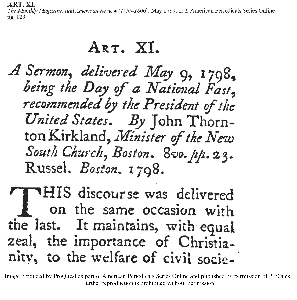 ―129― ―129―
Art. XI.
A Sermon, delivered May 9, 1798,
being the Day of a National Fast,
recommended by the President of the
United States. By John Thorn-
ton Kirkland, Minister of the New
South Church, Boston. 8vo. pp. 23.
Russel. Boston. 1798.
This discourse was delivered
on the same occasion with
the last. It maintains, with equal
zeal, the importance of Christia-
nity, to the welfare of civil socie-
 ―130― ―130―
ty; and is not less decided and
warm in inculcating the duty of sup-
porting the government of the
United States. The text is chosen
from Isaiah xxvi. 9. When thy
judgments are in the earth, the inha-
bitants of the world will learn righte-
ousness. After a short and appro-
priate introduction, the author pro-
poses, 1. “To show in what con-
sists the right improvement of pub-
lic evils and dangers;” and, 2. “To
apply the subject to the present cir-
cumstances of the world, and espe-
cially of our own country.” Under
the first head, Mr. K. undertakes to
show, that the judgments of God
call us, 1. To acknowledge his
providence; 2. To submit to his
will, and confide in his wisdom and
power; 3. To repent of all sin; and,
4. To return to the practice of our
whole duty, and especially those
parts of it to which recent experi-
ence, or the exigencies of the times
give a peculiar importance and ob-
ligation. Under the second head,
his object is to develope the nature
and sources of our national dangers,
and to show the peculiar duties which
the “afflictive and hazardous situa-
tion” in which we are placed, de-
mands.
We consider this discourse as
exhibiting a very handsome speci-
men of talent. The style is, in ge-
neral, correct, polished, and ner-
vous;—the reasoning perspicuous,
firm, and manly;—and the whole
aspect of the composition of that
dignified and serious kind, which
becomes the solemnity of pulpit ad-
dress. The objection which has
been made by some against ming-
ling religion and politics, if it be a
just objection at all, will lie with
full as much, if not greater force
against this sermon, than that which
was noticed in the preceding arti-
cle. But on this question we shall
not attempt to wrest from our read-
ers the prerogative of deciding for
themselves.
|